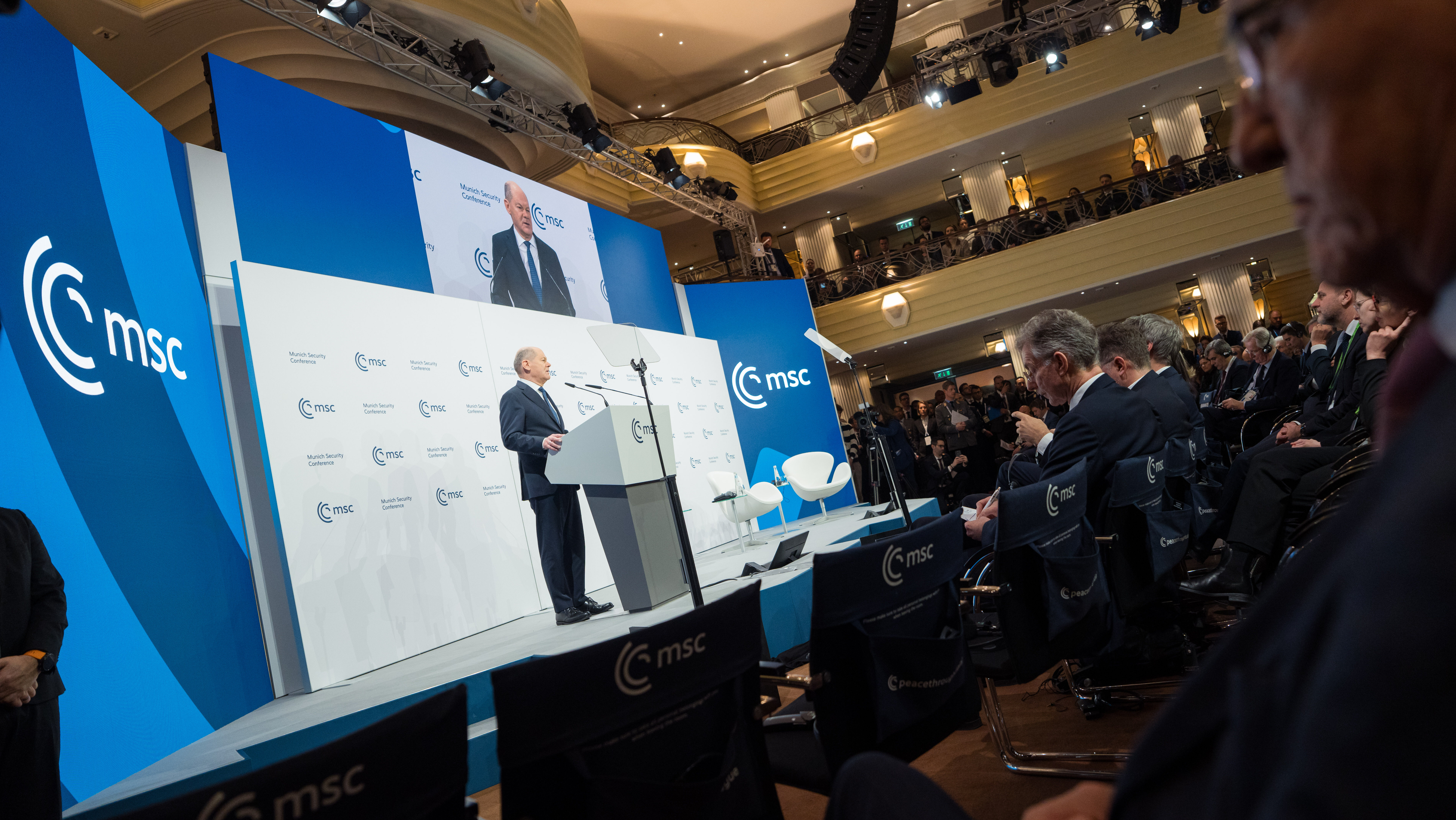
German
Chancellor
Olaf
Scholz
addresses
delegates
at
the
Munich
Security
Conference
Photo:
MSC/Tobias
Koehler
MUNICH
—
German
Chancellor
Olaf
Scholz
received
rapturous
applause
from
European
officials
in
a
fiery
speech
at
the
Munich
Security
Conference
that
took
issue
with
controversial
claims
from
US
Vice
President
JD
Vance
surrounding
alleged
democratic
infringements
across
Europe,
hate
speech
and
supposed
mistreatment
of
the
far-right,
Alternative
for
Germany
(AfD)
party.
“We
will
not
accept
that
people
who
look
at
Germany
from
the
outside
intervene
in
our
democracy,
in
our
elections
and
in
the
democratic
opinion
forming
process
in
the
interest
of
this
party,”
said
Scholz.
“That
is
just
not
done,
certainly
among
friends
and
allies.
We
resolutely
reject
this.”
He
went
on,
“as
a
strong
democracy,
we
are
absolutely
clear
that
the
extreme
right
should
be
out
of
political
control
and
out
of
political
decision
making
processes
and
that
there
will
be
no
cooperation
with
them….I
think
there
is
strong
consensus
between
all
relevant
parties
in
Germany”
on
the
matter.
“Where
our
democracy
goes
from
here
is
for
us
to
decide”
Scholz
added.
German
elections
are
set
to
take
place
next
week
after
the
collapse
of
Scholz’s
three
party
coalition,
with
polling
indicating
that
the
AfD,
whose
critics
have
compared
them
to
neo-Nazis,
is
on
course
to
return
the
second
largest
vote,
behind
the
Christian
Democratic
Union
(CDU).
Scholz’s
Social
Democratic
Party
of
Germany
is
sitting
in
third
place.
Scholz’s
comments
came
the
day
after
Vance
appeared
at
Munich
and
gave
a
speech
blasting
European
politicians
for
what
he
called
suppressing
far-right
parties
in
their
countries
—
in
essence,
using
the
security
forum,
which
is
traditionally
a
home
for
cross-Atlantic
coalition
building
on
defense
issues,
to
attack
America’s
allies.
Vance’s
remarks
suggesting
Europe’s
main
threat
sits
“from
within”
seemed
to
shock
attendees
here.
US
President
Donald
Trump,
who
did
not
make
the
trip
to
Munich,
endorsed
the
Vance
message
saying,
it
was
a
“very
good
speech,
actually
very
brilliant.”
Following
the
speech,
European
officials,
who
have
been
cautious
in
their
comments
about
the
newly-inaugurated
Trump
administration,
seemed
ready
to
drop
the
veil
of
politeness,
with
Scholz
—
seeking
to
bolster
his
party’s
diminishing
chances
at
home
—
providing
the
most
open
pushback.
Asked
on
stage
after
his
address
if
there
was
anything
in
Vance’s
speech
worth
reflecting
on,
Scholz
sarcastically
replied,
“You
mean
all
this
very
relevant
discussions
about
Ukraine
and
security
in
Europe?” Those
gathered
hummed
with
laughter,
amid
a
sense
that
Vance’s
blindside
attack
on
European
democracy
has
thrown
transatlantic
relations
into
a
tailspin.
Vance’s
words
have
demonstrated
that
the
US
looks
to
be
more
of
“a
divisive
force,
perhaps
not
[a]
uniting
force
in
Europe,”
Alina
Polyakova,
president
and
CEO
of
the
Center
for
European
Policy
Analysis,
told
Breaking
Defense
on
the
sidelines
of
the
conference.
Polyakova
said
another
delegate
at
the
conference
had
spoken
of
how
a
“two-front”
war
has
effectively
emerged
for
Europe,
comprising
of
the
conventional
conflict
with
Russia
and
a
fight
with
the
US
over
“values
and
principles.”
Ukraine
Major
Focus
At
Munich
In
the
lead
up
to
the
conference, Trump
administration
officials
have moved
away
from
Ukraine’s
long
held
conditions
for
securing
peace
with
Russia:
the
return
of
illegally
seized
territory
by
Russia
and
future
US
security
guarantees.
In
addition,
comments
from
Trump
have
raised
fears
that
he
plans
to
negotiate
directly
with
Russian
President
Vladimir
Putin
about
Ukraine,
sidelining
Kyiv
and
its
European
allies
entirely.
European
leaders
here
have
been
pushing
the
message
that
Ukraine
must
be
involved
in
such
talks,
including
Swedish
defense
minister
Pål
Jonson,
who
told
Breaking
Defense
on
Friday
that
“There
can
be
no
talking
about
Ukraine
without
Ukraine.”
“We
don’t
know
what
the
US
position
is”
on
Ukraine,
said
Polyakova.
“The
last
few
days,
we’ve
heard
a
lot
of
different
ideas
and
a
lot
of
different
positions
from
various
parts
of
the
administration
here
in
Munich.
“There
is
no
policy,
there
is
no
strategy.
There’s
a
threat
and
it’s
unclear
to
me
how
real
that
is.”
Ukraine
giving
up
half
of
its
mineral
reserves
in
exchange
for billions
of
dollars
of
US
military
aid
has
also
been
floated
by
the
Trump
administration.
Treasury
Secretary
Scott
Bessent
reportedly
this
week
presented
Ukrainian
leader
Volodymyr
Zelenskyy
with
a
draft
contract
that
would
sign
half
of
Ukraine’s
mineral
wealth
to
the
US,
something
the
Ukrainian
leader
reportedly
did
not
agree
to.
“There’s
a
deal
to
be
had
there,”
said
Polyakova.
“The
Ukrainians
could
basically
say,
‘look,
60
percent
of
these
deposits
are
in
Russian
occupied
territory,
you
give
us
the
weapons
to
take
back
the
land,
you
can
have
it.
And
that
is
the
kind
of
transactional
mentality
that
I
think
is
appealing
to
Trump.”
Despite
Scholz
being
quick
to
dismiss
Vance’s
failure
to
make
Ukraine
more
of
a
priority,
he
made
it
clear
that
at
a
fundamental
level,
he
is
on
board
with
US
thinking.
“We
stand
at
the
side
of
Ukraine,
which
has
come
under
attack,
and
I’m
therefore
pleased
that
the
American
administration
has
reaffirmed
our
common
objective
of
preserving
the
sovereign
independence
of
Ukraine,”
he
said.
“This
sovereign
independence
has
also
been
reflected
in
the
negotiations.”
He
added
that
it
is
“right
Ukraine
is
involved
as
we
begin
to
talk
directly
with
Russia.”
Scholz
also
revealed
that
he
has
spoken
to
Putin
“several
times”
and
put
to
him
what
a
“just
peace”
looks
like.
“I
trust
that
we
all
agree
that
Russia’s
war
against
Ukraine
must
end
as
quickly
as
possible,”
he
remarked.

